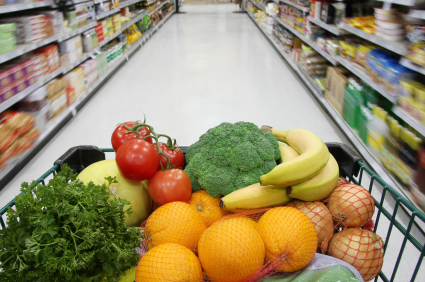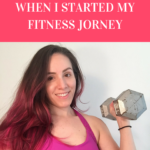
Credit: greggavedon.com | Flickr
I spent a few years being cray about eating clean. I used to bring Whole Foods organic turkey jerky and a measured bag of nuts to happy hour so I wouldn’t eat any bar food lmao. I remember an old coworker saying, “Damn, you do it by the book.” And I really did.
These days I’m more lax in my approach to food, but I do think that sort of dedication serves a purpose, especially for a person who’s just starting to learn how to eat better. I don’t advocate obsession or eating in a way that makes you miserable, but we must learn the rules before we can break them.
Moderation is what’s sustainable in the long run, but when we’re first learning to eat healthier it helps to go through a period where we’re more diligent with our consumption–so we can break certain habits and reinforce others. Take drinking water for example. It takes a conscious effort to make sure you get at least 8 cups a day, but eventually it becomes second nature. But that only happens if you go through the “strict period” where you’re carefully monitoring your intake. By buckling down on our nutrition we learn the effects that different foods have on our body and what it’s like to really live a healthy lifestyle.
However, being too strict can backfire and lead to binging. As with everything, there is a balance, a fine line between just right and too much. Lucky for you, I was strict long enough to see what ultimately mattered and what didn’t–and I’m sharing these with you so you don’t have to go through the headache.
So first, the minutiae that’s not worth the stress. At the end of the day the payoff for these things is not big enough to justify the mental energy spent worrying about them.
Sodium intake. Unless you are hypertensive, this shouldn’t be too much of a concern, but only if if the majority of your diet comes from unprocessed foods. When the bulk of what we eat is fruits, veggies and lean proteins, the occasional sodium-laden soup or restaurant meal isn’t going to tip the scale much. You might be bloated for a day or two but that dissipates so long as you stay on track.
Number of meals a day. Eating five to six times a day was the fad for a while. Did you know that there’s actually no evidence as of yet that eating more meals a day is better for you? At the end of the day, it’s still all about your energy balance, meaning calories in vs calories out. So go ahead and eat as many damn meals as you want, whether it’s five little meals or one huge entree–just as long as it leaves you feeling good and energized throughout the day.
Having a small “off-plan” treat. A few bites of bread or chocolate aren’t going to ruin your day. Neither is a little cream and sugar in your coffee. In fact, it might help you stay on track by preventing you from feeling deprived. Just be conscious of your serving size.
Meal timing. Eat within 30 mins of your workout, every 3 hours, but not too late. All these rules…can I just LIVE? You know who’s the ultimate authority on when you should eat? Your body. Listen to it. And yes, eating around the time you workout is best for gains, but other than that your intuition is your best guide. Do you FEEL hungry? Then you should probably eat. Not hungry? Don’t eat! Feeling low energy? Then you might need some healthy carbs and protein. Our internal cues will always trump the clock.
Now we probably all know the basic tenets of health: get enough protein, eat mostly plants, drink at least 64 oz of water, sleep 6 to 8 hours a night and exercise at least 30 minutes a day. But there are overlooked factors that can have a big impact on the way you look and feel. These sneaky little buggers are:
Non-Exercise Activity Thermogenesis (NEAT). While adopting a workout routine is certainly beneficial, it’s actually what we do outside the gym that has the greatest impact on the calories we burn and our posture. One hour in the gym isn’t enough to negate 23 hours of a sedentary lifestyle. For optimum health and weight loss, we should look at our overall activity level. How much are we walking, standing and doing functional movements? Take two people who don’t exercise. One is a restaurant server and the other works a desk job. The server is going to be burning way more calories and likely have better posture than the office worker.
Stress levels and your responses to them. Stress can cause us to overeat, over drink and smoke, which obviously wreaks havoc on our bodies. And it can still effect your body even if you don’t change the way you eat or exercise. I learned this recently as I started to go through my home renovation. I broke out and retained water despite my habits remaining the same. Stress is unavoidable, but what makes the biggest difference is the way we cope with it. Mindfulness for stress management is a great place to start.
How fast you eat. Have you ever been at a restaurant that took forever to bring you your entree? You may have gone 45 minutes snacking on your appetizer and sipping a drink. Despite your annoyance at how late your dinner is, you feel like you’re not even that hungry anymore. That’s because eating slow and drawing out the experience helps you to feel fuller on less food. Slowing down and really focusing on what you’re eating helps digestion, prevents overeating and increases satisfaction. Once again, mindfulness is key.
So there you have it. Have you been driving yourself nuts trying to follow a bunch of nutrition rules that leave you feeling overwhelmed and stretched thin? My invitation to you is to think about something you’ve been obsessing over that stresses you out. Then look at the big picture and see what you can let go of. And if you’re feeling extra generous, tell me about it in an email or comment 🙂



